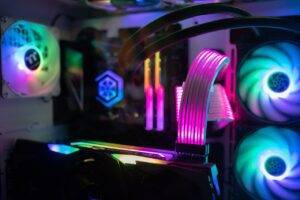<?xml encoding=”utf-8″ ?????????>
When it comes to diving into the world of gaming, one of the most critical decisions any gamer faces is whether to opt for a pre built AMD gaming PC or embark on the journey of constructing their own rig from the ground up.
Both choices have their merits and drawbacks, appealing to different segments of gamers based on their preferences, budgets, and technical acumen. In this detailed exploration, we’ll thoroughly examine the advantages and disadvantages of both pre-built gaming PCs and building your own system, providing you with a comprehensive understanding to guide your decision-making process effectively.
Pros and Cons of Pre-Built Gaming PCs
Before delving into the specific pros and cons of pre built AMD gaming PC‘s, it’s essential to understand the overarching benefits and drawbacks of opting for a ready-to-use system. While pre-built gaming PCs offer convenience and peace of mind, they also come with certain limitations compared to building your own system from scratch.
Pre-Built Gaming PCs Pros:
Time-Saving: With a pre-built gaming PC, you can skip the time-consuming process of researching and selecting individual components. This can be particularly beneficial for individuals with busy schedules or those who prefer a plug-and-play solution.
Compatibility Assurance: Pre-built systems are meticulously configured and tested by manufacturers to ensure compatibility and stability. This minimizes the risk of compatibility issues between components, providing a hassle-free gaming experience.
Warranty Coverage: Most pre-built gaming PCs come with comprehensive warranties that cover hardware defects and malfunctions. This offers peace of mind to users, knowing that they can rely on manufacturer support in the event of any issues.
Out-of-the-Box Performance: Pre-built gaming PCs are optimized for performance right out of the box. Manufacturers often fine-tune system settings and drivers to maximize gaming performance, providing users with a seamless gaming experience from day one.
After examining the pros of pre-built gaming PCs, it’s crucial to acknowledge the accompanying drawbacks that users should consider before making a purchase decision. Despite their convenience, pre-built systems may come with some disadvantages.
Pre-Built Gaming PCs Cons:
Limited Customization: While pre-built gaming PCs offer convenience, customization options are often limited compared to building your own system. Users may have limited choices when it comes to selecting specific components or upgrading individual parts.
Higher Price Tag: Pre-built gaming PCs typically come with a higher price tag compared to building your own system. This is due to markup costs associated with assembly, testing, and warranty services provided by manufacturers.
Potential Bloatware: Some pre-built gaming PCs come with pre-installed software or bloatware that may not be necessary for gaming purposes. Users may need to spend time removing or disabling unnecessary software to optimize system performance.
Upgradability Constraints: While pre-built systems can be upgraded, they may have limitations in terms of compatibility and space for additional components. Users should consider future upgrade options when selecting a pre-built gaming PC.
Despite these drawbacks, pre-built gaming PCs offer a convenient solution for gamers who prioritize ease of use and reliability. For individuals with limited technical expertise or time constraints, a pre-built system can provide a hassle-free gaming experience without the complexities of DIY assembly.
Pros and Cons of Building Your Own Gaming PC
Before exploring the specific pros and cons of building your own gaming PC, it’s essential to highlight the unique advantages and challenges associated with this approach. While DIY assembly offers unparalleled customization and flexibility, it also requires technical expertise and careful consideration of compatibility and assembly processes.
Own Gaming PC Pros:
Customization Flexibility: Building your own gaming PC allows you to handpick each component according to your specific preferences and requirements. This level of customization enables you to create a system tailored to your gaming needs, whether it’s for high-performance gaming or content creation.
Educational Experience: Building a custom PC can be a valuable learning experience, providing insight into PC hardware and assembly processes. It allows enthusiasts to develop technical skills and knowledge that can be applied to future projects or troubleshooting scenarios.
Cost Savings: Building your own gaming PC can be more cost-effective in the long run, as it eliminates assembly and markup costs associated with pre-built systems. Savvy shoppers can take advantage of discounts, promotions, and sales to source components at competitive prices.
Future Upgradability: DIY-built gaming PCs offer greater flexibility for future upgrades and expansions. Users can easily swap out individual components or upgrade to newer hardware as needed, extending the lifespan and performance of their system.
After examining the advantages of building your own gaming PC, it’s essential to address the potential challenges and considerations that users may encounter during the DIY assembly process. Despite its benefits, building a custom PC requires careful planning, research, and technical proficiency to ensure a successful and satisfying outcome.
Own Gaming PC Cons:
Technical Complexity: Building a gaming PC requires a certain level of technical knowledge and research. Beginners may find the process overwhelming, especially when it comes to selecting compatible components and assembling them correctly.
Time-Consuming Assembly: Building a gaming PC from scratch can be a time-consuming process, particularly for individuals new to PC building. It involves tasks such as cable management, thermal paste application, and BIOS configuration, which may require patience and attention to detail.
Potential Compatibility Issues: DIY builders need to ensure compatibility between components to avoid issues such as bottlenecking, instability, or hardware conflicts. This requires thorough research and attention to detail during the component selection process.
Limited Warranty Coverage: Unlike pre-built gaming PCs, DIY-built systems may not come with comprehensive warranties that cover the entire system. Individual components may have separate warranty terms and conditions, requiring users to manage warranty claims independently.
Despite these challenges, building your own gaming PC offers unparalleled satisfaction and customization options for enthusiasts who enjoy tinkering with hardware and maximizing performance. For those willing to invest time and effort into DIY assembly, the rewards of creating a personalized gaming rig tailored to their exact specifications can outweigh the initial complexities and challenges.
In summary, weighing the pros and cons of both pre-built gaming PCs and building your own system is essential for making an informed decision that aligns with your gaming preferences, budget, and technical proficiency. Whether you prioritize convenience and peace of mind or customization and control, understanding the trade-offs associated with each option can help you choose the best approach for your gaming needs.
Factors to Consider when Choosing Pre-Built Gaming PCs
While pre-built systems offer convenience and peace of mind, they also come with certain limitations that users should be aware of. Here are some key factors to keep in mind:
Price: Pre-built gaming PCs often come with a higher price tag compared to building your own system due to additional costs associated with assembly, testing, and warranty services. However, this higher upfront cost may be justified for individuals prioritizing convenience and peace of mind.
Customization Options: While pre-built systems offer convenience, customization options may be limited compared to building your own PC. Users should carefully assess their gaming requirements and preferences to ensure that a pre-built system meets their needs adequately.
Warranty and Support: Pre-built gaming PCs typically come with manufacturer warranties and technical support, providing added peace of mind for users. When selecting a pre-built system, it’s essential to consider the duration and coverage of the warranty, as well as the quality of customer support offered by the manufacturer.
Performance and Specifications: When evaluating pre-built gaming PCs, consider factors such as processor, graphics card, RAM, and storage capacity to ensure optimal gaming performance. Users should assess the system’s specifications relative to their gaming requirements, paying particular attention to factors such as frame rates, resolution, and graphical fidelity.
In conclusion, the choice between purchasing a pre-built gaming PC and building your own system hinges on a variety of factors, including personal preferences, budget constraints, and technical proficiency. Whether you opt for the convenience of a pre-built AMD gaming PC or the customization options afforded by DIY assembly, reputable suppliers like Starla offer a diverse range of IT and electronic components to meet your gaming needs. By carefully weighing the pros and cons of each option and considering key factors such as price, customization options, warranty, and performance, you can make an informed decision that aligns with your gaming aspirations and preferences.

























